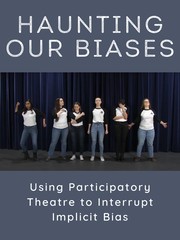Buy this book

This project invites learners to deepen their self-reflexivity about the implicit biases that they hold, and the impact of not addressing these biases. In participatory theatre, this kind of invitation for self-exploration can haunt us. Haunting refers to the thoughts that remain after the educational encounter, leaving a lasting impression that can evoke self-reflexive actions and behaviours. Our purpose is to help people slow down, reflect, and recognize that sometimes our responses to situations and people are based on assumptions, that are guided by implicit biases rather than facts. If we can get in the habit of slowing ourselves down and considering how our biases might be shaping our decisions and conclusions, we can then explore alternative interpretations. This in turn helps us to consider more ethical, just, and respectful responses. Recognizing and minimizing implicit bias is a process. There is no end point. There are, however, starting points, and also “starting again” points. Our hope that learners will leave this educational encounter haunted—reflecting on what they have learned in such a way that the knowledge and the reflexive skills gained stay with them throughout their careers.
This project invites learners to deepen their self-awareness about the implicit biases that they hold. In participatory theatre, this kind of invitation for self-exploration can haunt us, leaving a lasting impression that can evoke self-reflexive actions and behaviours.
Buy this book

| Edition | Availability |
|---|---|
|
1
Haunting our Biases: Using Participatory Theatre to Interrupt Implicit Bias
2022-02-28, eCampusOntario Open Authoring Platform, Pressbooks
Ebook
in English
|
aaaa
|
Book Details
Edition Notes
Contributors
The Physical Object
Edition Identifiers
Work Identifiers
Community Reviews (0)
| May 25, 2022 | Created by ImportBot | import new book |









